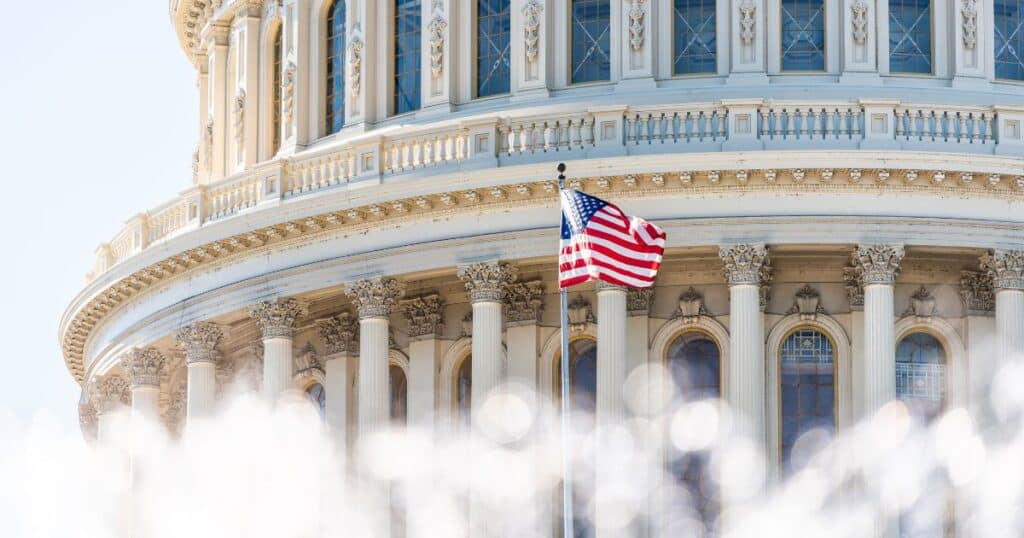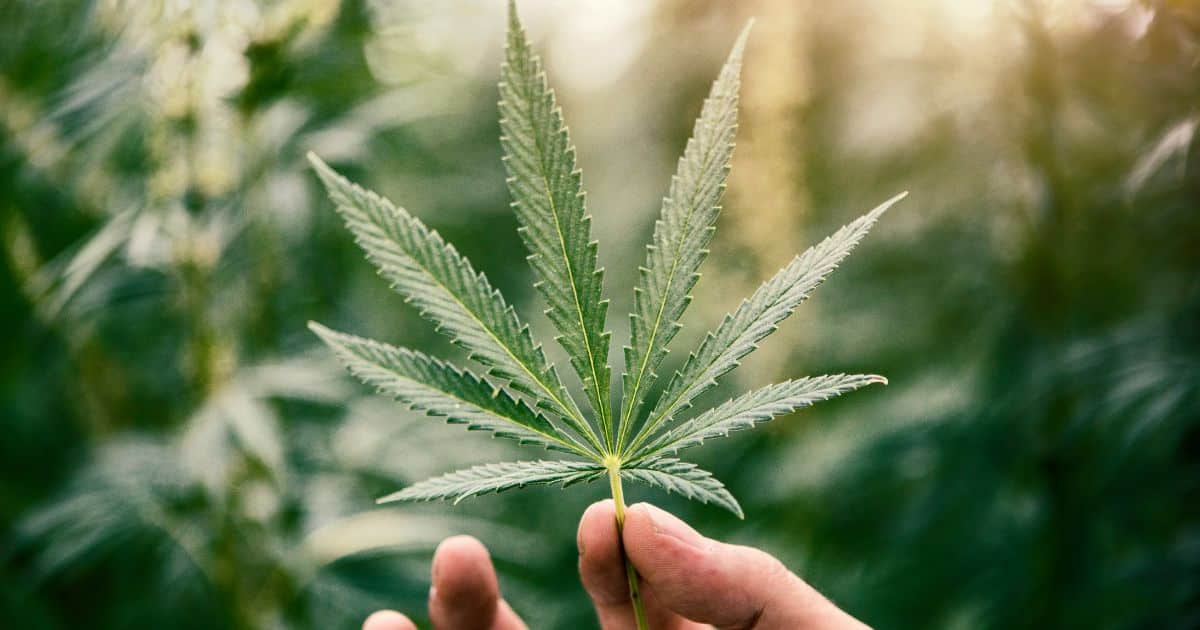In a political climate where heated discussions dominate headlines, there’s one topic that’s been simmering for far too long – cannabis descheduling. The recent press is buzzing with the proactive push from a group of Democratic leaders to see marijuana removed from the Controlled Substances Act (CSA).
But what does this mean for the marijuana market, and is this step really as significant as it seems? Let’s delve into the details and understand why this issue warrants immediate attention.

You’ve probably caught wind of it—the resolute and rallying of Democratic senators, including, Majority Leader Chuck Schumer, Elizabeth Warren, and John Fetterman, who are not just nudging, but firmly urging the Biden administration to deschedule marijuana. This is a clear indication that the momentum for federal reform is building.
This action doesn’t just come out of the blue; it’s rooted in the growing body of evidence that supports the medicinal and therapeutic benefits of cannabis. As evidenced by the HHS recommending the DEA move marijuana out of the classification of a Schedule I drug to a Schedule III drug under the CSA. This came after President Biden directed HHS and DOJ to “review expeditiously how marijuana is scheduled under federal law, in October 2022.
The senators’ directive to Attorney General Merrick Garland and DEA Administrator Anne Milgram couldn’t be more straightforward: deschedule marijuana, erase its status as a Controlled Substance, and liberate it from some of the most draconian legal implications in modern history.
The Ripple Effect on Marijuana Markets
Decades of a tainted legal status mean that the marijuana industry has had to navigate treacherous waters, often at the mercy of an inconsistent legal framework. Descheduling cannabis could herald a new era for marijuana businesses, freeing them from onerous regulatory constraints that stifle growth and innovation. The potential market implications are staggering, and within this legislative letter lays a monumental opportunity—for entrepreneurs, investors, and consumers alike.
“The case for removing marijuana from Schedule I is overwhelming. The DEA should do so by removing cannabis from the CSA altogether, rather than simply placing it in a lower schedule.” says the letter.
But let’s pause and hash out a critical concern here. While the lane to legalization seems freshly paved, rescheduling marijuana rather than descheduling it might just open the door even more to the big sharks—Big Pharma, Tobacco, and Alcohol, who are certainly no strangers to regulatory labyrinths.
Imagine this: with marijuana rescheduled, the necessary red tape to bring a cannabis product to market could skyrocket. We’re talking about serious bankroll needed to jump through those hoops—a financial playground where these industry titans frolic with ease.
You see, should marijuana trade its shackles for a new set of chains, it’s the small growers and dispensaries that could be left in the dust. Rescheduling could inadvertently serve up the cannabis industry on a silver platter to those who have the means to navigate the complex regulatory systems and invest heavily.
The risk here is clear: without the right safeguards, rescheduling might not be the panacea for an equitable marketplace we’re all rooting for. It’s about making sure the green rush doesn’t become a green washout for the pioneers who’ve been tending to this industry all along.
The descheduling of marijuana would signal an enormous shift in federal policy, aligning it more closely with the progressive measures already taken by the majority of states. This move wouldn’t just loosen the federal grip on cannabis; it could quite literally revolutionize the industry, finally placing it on stable ground for the first time in over half a century.
What Descheduling Marijuana Really Means
Descheduling marijuana would not only symbolize a seismic shift in federal drug policy, but it would also have tangible, immediate consequences. Removing cannabis from the CSA entirely acknowledges the stark reality that marijuana, in all its forms, is not a narcotic on par with heroin or LSD; it’s a plant that boasts an array of uses from the medicinal to the recreational.
For individuals, particularly those in communities long impacted by strict marijuana laws, it represents a glimmer of social justice. No longer will the possession of a single joint carry the weight of an unforgiving system. Descheduling opens the door for these citizens to reclaim their rights and for the criminal justice system to refocus its energy on more pressing issues. In the letter, they argue that rescheduling marijuana would do little to change the harm of the current system in place, saying:
“Rescheduling would do little to rectify the most severe harms of the current system. … (The) criminal penalties for recreational marijuana use, and for medical use of marijuana products that lack federal approval, would still exist, disproportionately penalizing Black and Brown communities. Similarly, non-citizens could still be denied naturalization and green cards, and even (be) deported, based on recreational marijuana use and most marijuana offenses,” continued the Senators. “The Biden Administration has a window of opportunity to deschedule marijuana that has not existed in decades and should reach the right conclusion — consistent with the clear scientific and public health rationale for removing marijuana from Schedule I, and with the imperative to relieve the burden of current federal marijuana policy on ordinary people and small businesses.”
The letter was signed by Democratic Sens. Elizabeth Warren (Mass.), John Fetterman (Pa.), Chuck Schumer (N.Y.), Cory Booker (N.J.), Jeff Merkley (Ore.), Kirsten Gillibrand (N.Y.), Ron Wyden (Ore.), John Hickenlooper (Colo.), Peter Welch (Vt.), Chris Van Hollen (Md.), Alex Padilla (Calif.) and Bernie Saners (VT.)
The proposition to deschedule marijuana is grounded in a clear, scientific, and social rationale. The democratic senators emphasize that marijuana’s place in the CSA’s most stringent schedule has led to grave injustices and is woefully outdated in the face of an evolving legal landscape. It underscores that as one of the most widely used substances, and with growing evidence of its therapeutic value, cannabis demands a more appropriate regulatory setting.
Moreover, the financial implications are significant. Millions of dollars are lost each year due to the inability of marijuana businesses to access normal tax deductions. The economic case for descheduling marijuana is as compelling as the social one, with the potential for billions in revenue and the creation of countless jobs.
But scientific evidence and the potential economic boom that would come with removing marijuana from the CSA is not only telling evidence that descheduling is the right path, notably its the voice of the people.
A recent Gallup poll about marijuana legalization in the United States found that 70% of Americans are in favor of legalization. The Gallup poll, which is one of the longest-running surveys on public opinion in the United States, has been tracking support for marijuana legalization since 1969. At that time, only 12% of Americans supported legalizing cannabis.
Over the past five decades, support for legalization has steadily increased, with significant jumps in recent years as more states have enacted their own legalization measures.
Public support for marijuana legalization has hit a 70% milestone. https://t.co/E7qgtCsd8x
— GallupNews (@GallupNews) November 8, 2023
The Road Ahead
The voices urging for cannabis descheduling are getting louder, but the path to policy change is labyrinthine at best. The complexities of federal drug policy, the nuances of legislative drafting, and the current political climate all play a role in determining the outcome of such a monumental decision.
The ball is now in the Biden administration’s court, and the cannabis community at large is watching with bated breath. The hope is that these words from the senators are not just powerful rhetoric but the prelude to real, substantive change. The administration’s response to this call will not only dictate the immediate future of the marijuana industry but also set a precedent for its place in American society.
Cannabis descheduling is not just about changing laws on paper; it’s about repairing the fabric of democracy that legal overreach has torn. It’s about creating a fair, just, and economically vibrant marketplace for a product that is now in the hands of millions.
As we navigate the complexities of these policy discussions, one thing is clear: the call for cannabis descheduling is growing more vocal by the day. This conversation is evolving, and its resolution has the potential to redefine the future of cannabis in America. This is not just a debate for lawmakers and political figures; it’s a cause that resonates with each person touched by the green revolution, from growers to consumers.
The cannabis industry is at the cusp of a historical breakthrough. With the backing of senators who understand the urgency of this issue, we can be cautiously optimistic. But until the ink dries on a new cannabis manifesto, the fight for descheduling continues.
It’s a fight for equity, progress, and the fundamental rights of those who stand to benefit the most from this long-overdue legislative change. So here’s to the hope that, soon, we won’t just be discussing the possibility of a descheduled marijuana—it will be the reality we live in.
Enjoyed that first hit? Come chill with us every week at the Friday Sesh for a freshly packed bowl of the week’s best cannabis news!
- Chicago Police Department Revises Policy on Searches Based Solely on Marijuana Odor
- Ohio’s Senate Bill 56 Postponed, Leaving Details of Issue 2 Still Unresolved
- Sports Stars and Well Known Entertainers Join Forces Calling on Trump for Cannabis Reform
- Pinsky and the Brain: Bill White on His Journey to Consulting in Cannabis
- Delaware’s Recreational Cannabis Market Finally Set to Launch After Years of Challenges
- Excise Tax Increase to 19% and Its Impact on California Retailers














